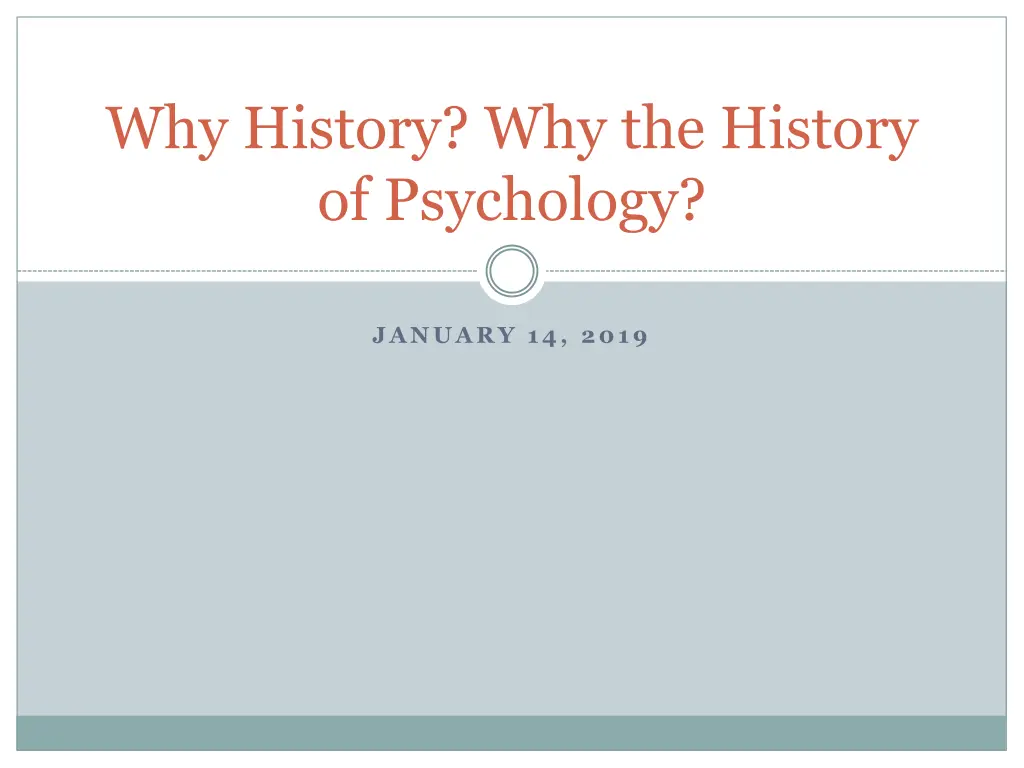
Understanding the Significance of Studying History in Psychology
Delve into the importance of studying history within the field of psychology to gain a deeper understanding of its evolution, recurring issues, and foundational assumptions. Uncover the challenges and methodologies involved in interpreting historical data, providing crucial insights into shaping the future of psychological research.
Download Presentation

Please find below an Image/Link to download the presentation.
The content on the website is provided AS IS for your information and personal use only. It may not be sold, licensed, or shared on other websites without obtaining consent from the author. If you encounter any issues during the download, it is possible that the publisher has removed the file from their server.
You are allowed to download the files provided on this website for personal or commercial use, subject to the condition that they are used lawfully. All files are the property of their respective owners.
The content on the website is provided AS IS for your information and personal use only. It may not be sold, licensed, or shared on other websites without obtaining consent from the author.
E N D
Presentation Transcript
Why History? Why the History of Psychology? JANUARY 14, 2019
Why study history at all? Knowing the history of anything helps us understand it better we know how it came to be Q: Current events? How did it come to be? Helps place current problems in context gives us perspective Q: Are IQ tests accurate? Psychology = young science
Why Study Psychologys History? Examine recurring issues E.g., nature vs. nurture Appreciate assumptions that have shaped us Provides unity to ever-specializing field of study Shields from repeating bad behaviors (hopefully) Enhances critical thinking
Histiography Theory & methodology of history the past history History = interpretation of the past Lots of issues in studying history
Problems with interpreting history Interpretation problems Historians biases
History is hard. Hanoi Hilton Vietnam War H a L Prison
Problems with interpreting history Interpretation problems Historians biases Continual need of being rewritten New information, new ways of interpreting old information Data selection MASSIVE amounts of data Often guided by hypotheses and research questions Problem of missing data How to approach historical truth Darwin-like struggle of competing ideas proposed by good- faith historians from variety of perspectives
Sources of historical data Primary data First person accounts Typically found in archives (collections of works) Correspondence, diaries, minutes of meetings, lab notes, photos and video, drafts of papers, apparatus diagrams Secondary data How people have interpreted primary sources Textbooks, reproductions, translations, lectures, etc.
Old vs. New History (Furumoto, 1989) Old History Celebrate cumulative progress in psychology over the years Great men, Great events, & Classical studies Problem perpetuates origin myths Are ideas a product of people or times? Example Triplett s Social Facilitation New History Fits psychology into overall historical context More critical than celebratory Done by professional historians Both represent distinct ways of thinking
Old vs. New History Old History Presentist New History Contextualist Internal External Personalistic Naturalistic
Presentism vs. Contextualism Presentism Evaluating history with reference to modern values and knowledge ( Hindsight is 20/20 ) Hard to avoid we know the outcome! Contextualism Evaluate history with reference to what is known at time Understanding history in its own context Example Nazi guards Why did they do what they did? (Actually how social psychology developed)
Internal vs. External Internal history History of ideas within a discipline E.g., development of theory over time External history Factors outside of discipline that affect discipline s history Historical context Social, cultural, institutional, economic factors
Example: Cognitive Psychology Internal External
Personalistic vs. Naturalistic Personalistic Focuses on accomplishments of individuals who make history Produces eponyms E.g., Darwinian evolution, Watsonian behaviorism Naturalistic Focuses on influence of present age on historical events Zeitgeist spirit of the times (Favorite concept of E.G. Boring, psychology s best known historian) Supported by existence of multiples
Famous Multiples Evolution Darwin vs. Alfred Russel Wallace Autism Leo Kanner vs. Hans Asperger






















